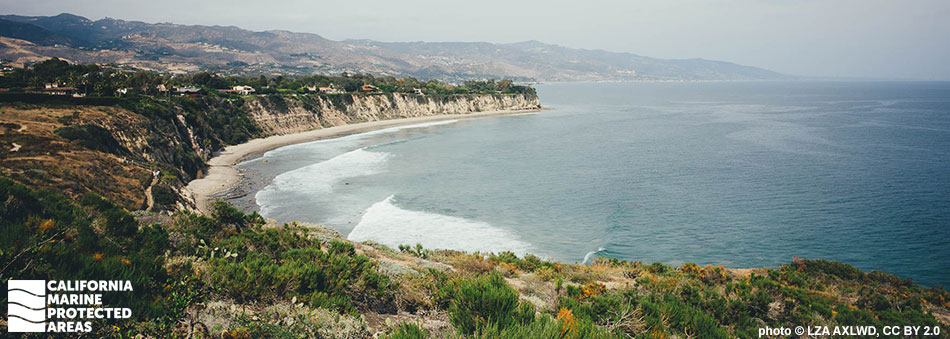Overview

Point Dume State Marine Reserve (SMR) and Point Dume State Marine Conservation Area (SMCA) are located adjacent to one another along the coastline near Malibu in Los Angeles County. These marine protected areas (MPAs) hug the Point Dume promontory, a coastal flatland bluff that juts south into the Pacific Ocean and forms the northern end of Santa Monica Bay.
Point Dume SMR, which covers more than 7½ square miles off the tip of Point Dume, extends to depths of nearly 2,000 feet. The SMR protects an expanse of sandy beach, rocky shores, kelp forests, surfgrass beds, an upwelling zone, and nearly two square miles of deep submarine canyon.
Point Dume SMCA, the larger of the two MPAs, protects nearly 16 square miles extending to depths greater than 2,000 feet. The SMCA protects an expanse of sandy beach and seafloor habitat, rocky shores, kelp forests, surfgrass beds, an upwelling zone, and less than a quarter square mile of deep submarine canyon, which together create an area of high biodiversity. The SMCA also provides for excellent surfing, diving, tidepooling, and whale watching opportunities.
Regulations
Point Dume SMR
It is unlawful to injure, damage, take, or possess any living, geological, or cultural marine resource.
California Code of Regulations Title 14, Section 632(b)(118)(opens in new tab)
Point Dume SMCA
It is unlawful to injure, damage, take, or possess any living, geological, or cultural marine resource, EXCEPT:
Recreational take of white seabass and pelagic finfish (northern anchovy, barracudas, billfishes, dorado (dolphinfish), Pacific herring, jack mackerel, Pacific mackerel, salmon, Pacific sardine, blue shark, salmon shark, shortfin mako shark, thresher shark, swordfish, tunas, Pacific bonito, and yellowtail) by spearfishing is allowed.
Commercial take of coastal pelagic species (northern anchovy, Pacific sardine, Pacific mackerel, jack mackerel, and market squid) by round-haul net, brail gear, and light boat; and swordfish by harpoon is allowed. Not more than five percent by weight of any commercial coastal pelagic species catch landed or possessed shall be other incidentally taken species. Includes take exemptions for the following tribe:
- Santa Ynez Band of Chumash Indians
California Code of Regulations Title 14, Section 632(b)(117)(opens in new tab)
Quick Facts
Point Dume SMR
MPA size: 7.53 square miles
Shoreline span: 2.9 miles
Depth range: 0 to 1,987 feet
Habitat composition*:
- Rock: 0.50 square miles
- Sand/mud: 7.27 square miles
Point Dume SMCA
MPA size: 15.92 square miles
Shoreline span: 4 miles
Depth range: 0 to 2,023 feet
Habitat composition*:
- Rock: 0.33 square miles
- Sand/mud: 15.71 square miles
*Habitat calculations are based on three-dimensional area and may exceed the total MPA area listed above.